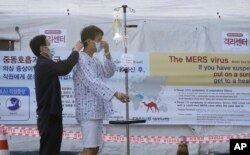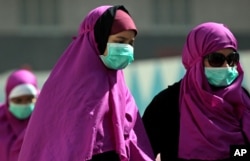South Korean health officials have confirmed the country’s first two deaths from Middle East Respiratory Syndrome. Officials reported Wednesday that the disease, known as MERS, has infected 30 people nationwide.
The South Korean Ministry of Health says the Middle East Respiratory Syndrome was linked to two deaths on Monday.
The victims were a 71-year-old man and a 58-year-old woman who died of acute respiratory failure. Acute respiratory infection prevents the body from getting oxygen and can result in death. Tests showed both patients were infected with the MERS virus before they died.
Different levels of exposure
South Korean officials also reported on the growing number of MERS patients. They said two of the newest patients were infected differently than the others. These two are apparently the first in South Korea to become infected by what officials called “third level exposures.”
Until now, all of the infected patients had direct contact with the first person known to have MERS in South Korea. This makes these patients “second level exposures.” All the patients in South Korea have been numbered and their exposure recorded.
A man named Kwon Jun-wook is the director of South Korea’s MERS management team within the Ministry of Health And Welfare. He says the person known as Patient 1 was a 68-year-old Korean man. He became infected in May after returning to Seoul from a trip to Bahrain, Saudi Arabia and the United Arab Emirates. But Mr. Kwon says the two new cases have been linked -- not to Patient 1 -- but to Patient 16.
Quarantines, travel bans and other precautions
Mr. Kwon says it appears the virus has been contained. He said all of the cases identified within the past few days have come from those who were already quarantined. They were forced to live apart from others, after being exposed to an infected person.
Mr. Kwon adds the South Korea government is now in the process of barring travel by anyone exposed to the virus.
VOA reporter’s in Seoul says most people do not appear to be taking steps to guard against MERS. He says South Korean workers and other people are going about their normal activities.
However, the country’s tourism industry may be affected. The Korea Tourism Organization estimates that about 2,000 Chinese and 500 Taiwanese have canceled trips to South Korea. Tour operators expect more cancelations if more cases of MERS are reported.
One visitor from the United Kingdom, a woman named Leanne Creasey, says the risk of getting MERS in Seoul is not nearly as great as the media is making it seem.
“I don’t think there have been that many cases of it here. And I don’t feel like just because there is a lot of media coverage or something, that I should necessarily believe that it is going to be that dangerous.”
Besides tourism, schools have also been affected. The Ministry of Education has canceled classes in more than 200 schools. Most of those schools are in or near the area where a woman died from the virus on Monday.
Protecting yourself from MERS
Kim Woo-joo is a professor of infectious diseases at Korea University. He is working with the government to contain the spread of the disease. He says wearing a mask over your face, washing hands repeatedly and covering your mouth when coughing should be enough to prevent infection.
The MERS outbreak in South Korea is the largest outside of the Middle East. There is also one reported case in China. The patient there is a Korean businessman who was reportedly exposed to Patient 1 in Seoul. He then traveled to China through Hong Kong before he was found to be infected.
MERS backgrounder
The MERS virus can produce symptoms, or warning signs, like those of another virus, influenza. The symptoms can include higher than normal body temperature and coughing. These symptoms can progress to pneumonia and kidney failure. There is no known cure or vaccine for MERS. Over 40 percent of people infected die from the disease.
The MERS virus was discovered in Saudi Arabia in 2012. The World Health Organization says the virus likely came from camels in the Middle East.
It is unclear how MERS passes from the animals to human beings. But the virus spreads between humans by coughing and by direct contact with fluids from infected people.
MERS is related to the common cold and SARS, the Severe Acute Respiratory Syndrome. Ten years ago, a SARS outbreak in China, mainly in Hong Kong, infected over 8,000 people and killed nearly 800. The World Health Organization says there have been over 1,000 MERS cases worldwide, with at least 400 related deaths.
I’m Jonathan Evans.
And I’m Anna Matteo.
VOA’s Brian Padden reported on this story from Seoul, South Korea. Anna Matteo adapted his report for Learning English. George Grow was the editor.
______________________________________________________________
Words in This Story
quarantine – v. to keep (a person or animal) away from others to prevent a disease from spreading : n. the situation of being kept away from others to prevent a disease from spreading
acute – adj. very serious or dangerous : requiring serious attention or action
respiration – n. medical : the act or process of breathing : respiratory is the adjective
exposure(s) – n. the condition of being affected by someone or something; expose – v. to be affected by someone or something








